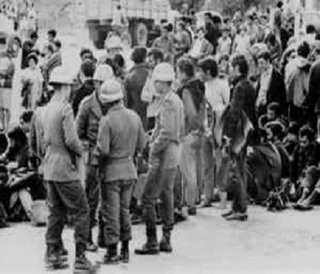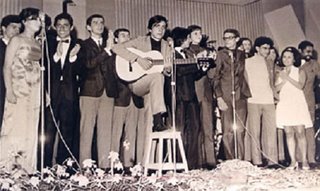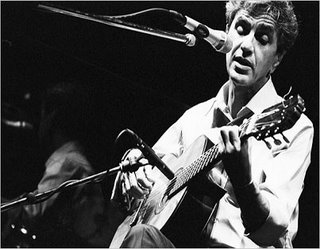Music in Brazil
Brazil has been through a lot of changes in the music scenario, most of the changes are due to the period such as the dictatorship when certain types of songs were not allowed.
This web project will show some of the main movements. It begins in the 60’s with Jovem Guarda, then we move to the 70’s, where the songs were secret protests against the dictatorship, after that, in the 80’s we have Barão Vermelho, Legião Urbana and Ultraje a Rigor representing the beginning of Brazilian rock and finally we move to the 90’s and the beginning of 2000 when we have Charlie Brown Jr. and CPM to represent nowadays rock in Brazil.
“The Brazilian pop music is born”
Jovem Guarda – 60s
The name “Jovem Guarda” was taken from a Vladmir Lenin's book and became the name of one of the most successful TV programs in 1965. It was hosted by the beginner singers Roberto Carlos, Erasmo Carlos and Wanderleia.

The King – Roberto Carlos
In 1963 Roberto Carlos appeared with “Splish Splash”, a rock song that would become the title of his LP that year. “Parei na Contramão” his next success made room for his biggest success until today, the song “Calhambeque”. With this Roberto Carlos began his kingdom through the music scenario.

Erasmo Carlos – "O Tremendão"
Erasmo Carlos had already experienced music before becoming well-known. It was in the “Renato & Seus Blue Caps” that, in 1962, he released his first LP. In partnership with Roberto Carlos he became, in 64, the name of the label in the ie-ie-ie market. “A Pescaria” and “Você me Acende” are the best examples of his music.
Wanderlea
She released her first LP in 1962, becoming one of the first women in the rock scenario. At the record company she meets Roberto Carlos and Erasmo Carlos, who would become her co-presenters in Jovem Guarda. Her greatest songs were “Pare o Casamento”, “Ternura” and “Prova de Fogo”.
Ronnie Von – The Little Prince
Also a big name in the Jovem Guarda movement, he began singing as a “Beatles” cover in novice shows. His first compact had “You’ve got to hide your love away” and “Meu bem”, a version from “Girl”, both from Lennon and Paul McCartney. His biggest success was “Pequeno Príncipe” by which he was known.
“Music and freedom”
A generation whose only voice was the music - 60s / 70s
Brazil dictatorship
(1964 – 1985) was a period of time when all the power was in military hands. There was no democracy, people had no rights, they couldn’t express themselves and their ideas, and if they didn’t obey these orders they would be censured and some cases tortured. Meanwhile, militaries sold the idea of a successful Brazil.

Music has been always a way for freedom of expression. Through the music we can achieve people in a easy and direct way. During this military government this was not different. People found the music the only way to have some freedom. Artists and musicians took part in the movement “ Diretas já“ (1984) asking for a balanced participation in the government.
During all these years of repression a lot of names came into the music scenario : Geraldo Vandré, Caetano Veloso and Chico Buarque were the most recognized names of strength and love for their country, people and freedom. Record TV channel festivals were a way to sing their songs and protest against the government and the situation.
In the period of dictatorship Geraldo Vandré wrote many protest songs and was considered one of the most important singers of his generation. He was banished from Brazil by military power and as a protest he didn’t appear in public for ten years. He participated in many festivals in the 60s with songs like: “ Disparada ” and
“ Pra não dizer que não falei das flores ” , which is considered, until now, a hymn against repression.

Born in 1942 in Bahia, Caetano Veloso is considered a revolutionary poet and a sentimentalist song writer. During all these years of military power he wrote songs like “London, London” and “Panis et Circensis”. He was arrested and banished from Brazil in 1969 because of his revolutionary ideas. Caetano Veloso is believed to be one of the most important names of MPB.

Also part of this brilliant generation, Chico Buarque, born in 1944 in Rio de Janeiro – Brazil. His interest in music began when he was five. Now, he is considered a genius, a poet, a revolutionary, one of the biggest names in Brazil history. His songs not only have words, but also meaning and expression. When releasing his first album he had problems with dictatorship censure and some of his songs were forbidden. To express his indignation about the government he participated in protests and festivals where he could sing his songs. Chico Buarque was obliged to leave Brazil and had a lot of plays and songs forbidden.

Raul Santos Seixas was born in July 28th, 1945, Salvador, Bahia. It is said that he was both a lunatic and a philosopher. Some people believe that all his messages and work were nothing but nonsense. On the other hand, a bunch of people believe Raul Seixas was one of the greatest philosophers ever. One could say he used to be a very unusual type of thinker, who will never be understood by anyone
By the age of seven, Raul found out in his father's personal library his first passion: Books. That is the reason why he knew a lot about culture and specially about languages. Since then the boy seemed to be lonely and quiet, spending most of his time reading and thinking.

School was something that used to disgust Raul Seixas: “I've nerver learned anything useful at school. Actually I think the only thing I’ve never learned at school was to hate it”, said the musician in 1964. This was the year when the musician joined some friends and started his first project: “Raulzito and the panters”. Despite the first bad impact the band caused into society, they all moved on. In 1967 Raul started to study to prove that school is useless. His theory might have been right: he attempted to a test for Law School, in one of the best universities of Brazil and he passed. As he hated studying, he nerver entered college, but he kept on working with his music.
Raul died in August 21st, 1989, from a heart attack, caused by stomach problems he had been having for more than ten years. His body may not be among us anymore, but his mind, his thoughts, his messages, his feelings, are still alive. Some of his albums such as “Eu nasci há dez mil anos atrás”; “Gita” and “ O Novo Aneon”, nowadays, are still best sellers. Raul Santos Seixas is not just another name, he is a context of philosophy turned into a compilation of words. That definitely is the reason why this thinker is still remembered as one of the most important people Brazil has ever had.
This decade has witnessed by the rise of Brazilian rock, which has been famous since the 70´s. Many bands like “Ultraje a Rigor” and “Ira!” are still playing nowadays. Other bands and singers like “Legião Urbana” and “Renato Russo”, were immortal and are still being played on radio due to the great success among teenagers.
“Ultraje a Rigor” is a band that started in the 80´s, created by Roger Moreira, and in 1983 became a big hit in Brazil with hits like “Inútil” e “Mim Quer Tocar”. In 1985 the band became well known because “Nós Vamos Invadir Sua Praia” album, then they were awarded with gold and diamond album to national rock and more recently they’ve received other prizes like the Brazilian best album.
Barão Vermelho is a Brazilian band that achieved success in 80’s, which was a tough period because Brazil was under the military dictatorship. The band played songs that talked about politics and encouraged the fans to go to the streets and fight a revolution. They didn’t agree with the government and found a way to fight things they didn’t agree in music.
Their vocal, Cazuza, was a very charismatic person but he discovered that he had a very serious disease. Then a very difficult period started for him and for all his fans that watched his war against AIDS. Cazuza tried to fight but there were no more ways. Even being treated in the best hospitals, he couldn’t resist anymore and died in 1990 at 32.

Rock in Rio - the festival
Rock in Rio is the biggest music festival of all times, which happened in Rio de Janeiro- Brazil. It was organized by “Roberto Medina”, who believed the festival could be a major opportunity to get people to build a Better World.
Afterwards, he concluded the country had all the necessary conditions and attributes to be part of the international show business circuit. He realized that while bringing international artists to Brazil, he could also generate jobs and stimulate tourism.
The first time this festival was seen in Brazil was in January, 1985.The Brazilian entrepreneur gathered some of the most famous music stars in the world in a place that he later called City of Rock. The first Rock in Rio festival lasted 10 days and it was amazingly nice. As it was such a success, Roberto decided to promote another one in 1991, as everybody wished it would happen.
On the other hand, the second festival was in a different place, overcoming the main difficulties (the economic panorama was not favorable to this sort of event). It was in the Maracanã stadium, where 700.000 people came around and crowded the place to have fun in a 9-days-party.
In 2001, Medina organized the third festival, which had a specially build scenario for Rock in Rio III and named Rock in Rio For a Better World. But there was something else at stake besides music and entertainment: the festival’s mainstay was then the social role it could play in people’s lives.
What's cool now!
There is no doubt about which kind of sound grew more in the past five years: punk-rock, hardcore, emocore. This is what the youth is listening. Influenced by American bands, such as Green-Day and Blink-182, bands like “CPM22” conquered the young Brazilian hearts with a strong melody and lyrics that talk about brokenhearted people. Wally, Luciano, Japinha and the front man Badauí – CPM22’s members – have achieved success among the young public.
Following the same heavy sound from CPM22, “Charlie Brown Jr. ” presents more political lyrics, mixed with a lot of rap. The band started in Santos, SP, but belongs to the whole Brazilian territory now. Their success is amazing and Chorão, the front man, is considered one of the best lyricists from Brazil.
We can’t forget that we are in Brazil, the land of samba. Mixing samba with rap made of “Marcelo D2”one of the most admired artists in Brazil. He is responsible for bringing samba back to the youngsters’ ears and mind. He’s an example of simplicity and never forgot about his poor background.
Hardcore, rap and samba: this mixture of rhythms fits Brazil, a country where everyone is welcome, no matter the race, economical condition or whatever. This country is a tropical salad of people and sound.
Project from
Andrea Marquezi
Daniel Assis
Felipe Figueiredo
Guilherme Marquezi
Maria Fernanda Gonçalves
Roberta Vendramini
Vanessa Hilsdorf
Advanced 3
Teacher Virginia
Centro Britânico
Pompéia Branch

0 Comments:
Post a Comment
<< Home